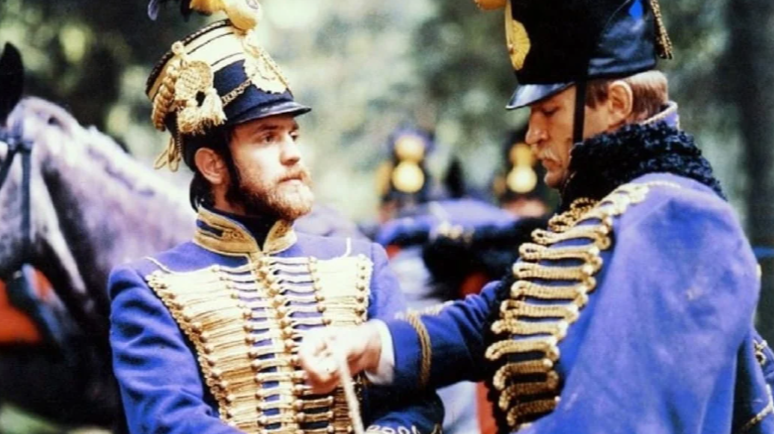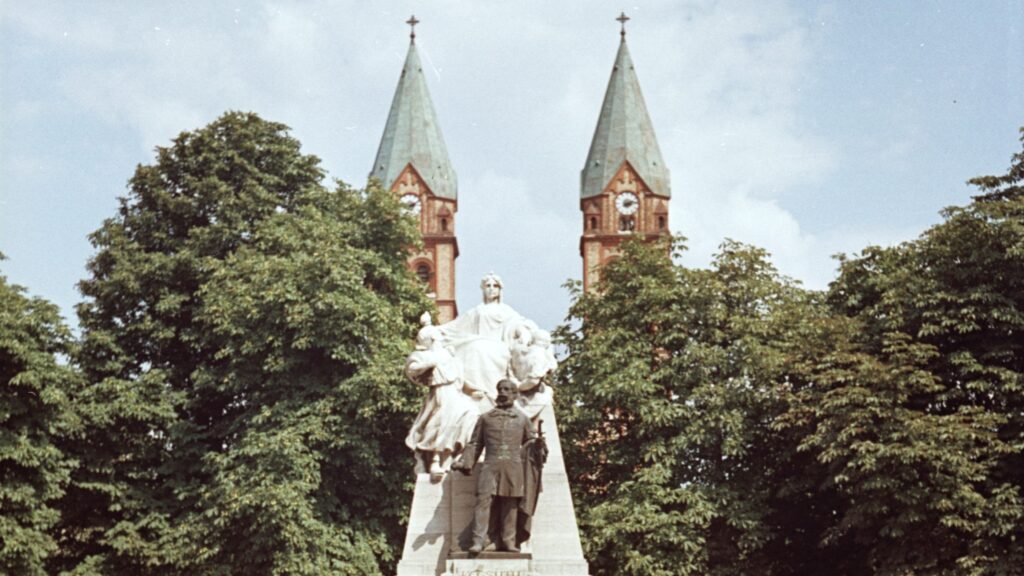The extraordinary Hungarian author Mór Jókai (born as Móricz Jókay of Ásva), also known as the ‘great storyteller of Hungary’, was born exactly 200 years ago today. Already as a boy he was blessed with a fertile imagination and was deeply intrigued by the arts—as a talented illustrator, he hoped to become a painter one day. Jókai’s parents had other plans, however, and insisted that he studied law. Bowing to his family’s wish the young Jókai did pursue legal studies in Kecsemét and Pest. Practising law, however, greatly bored his romantic spirit.
During his teenage years, when he was studying at the Calvinist college of Pápa, Jókai made acquaintances with another kindly spirit, Sándor Petőfi. In 1845, when Jókai moved to Pest, Sándor Petőfi, now known as Hungary’s national bard, was eager to introduce the newcomer to literary circles. The new acquaintances in the capital encouraged Jókai to write and eventually abandon his tedious profession. Soon, his novel, Weekdays was published first in a tabloid newspaper, then in hardcover, earning a good reputation and readership to him. His writing success was swiftly followed by Jókai’s change in career—leaving his legal profession behind, he became the editor of Életképek (Pictures of Life), the leading literary magazine of the time.
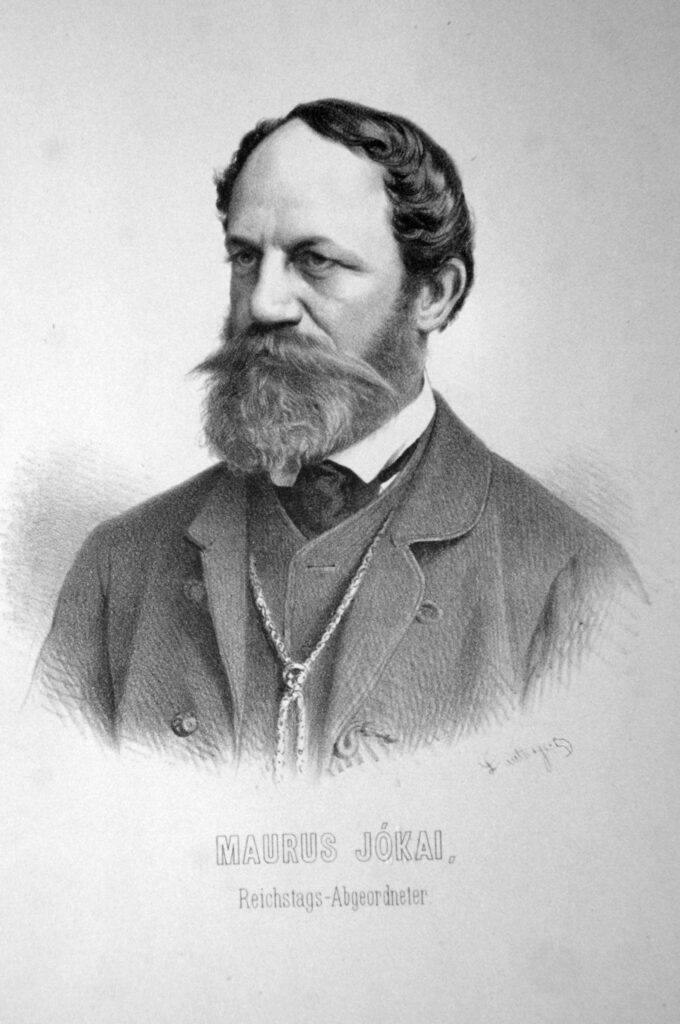
Not more than two years later, the outbreak of the Revolution of 1848 radically changed both Mór Jókai and Hungary. Alongside his friend, Petőfi, Jókai was heavily involved in the revolutionary events on 15 March 1848. In the Café Pilvax Jókai and Petőfi both took active roles in formulating the Twelve Points, the political demands of the radical youth. As such, the young author found himself at the centre of the Revolution.
It was not only Jókai’s political relationship with nationhood and its independence that radically transformed on that day, but his personal life too. The tumultuous day of 15 March was famously concluded by a theatre play at the evening—the national theatre chose to perform Ban Bánk, an opera banned by the Habsburg authorities at the time. The most renown actress of the city, Róza Laborfalvi played the role of Queen Gertrude, wife of Andrew II, whose assassination is at the centre of the plot of the opera. After the conclusion, members of the Youth of March, including Jókai, rushed onto the stage to speak to the ones who gathered. Subsequently, Róza Laborfalvi fastened red-white-and-green cockades, symbols of the revolution, on the Youth. According to the legend, as the beautiful Róza stood before Jókai on the stage in front of the crowd of patriots, the two fall in love immediately. Albeit Róza was 8 years older than Jókai, the lovers were dedicated to marrying. Despite the custom of the time, and the disapproval of both Jókai’s family and friend, Petőfi, Róza and Mór did marry within the next couple of months, during the summer of 1848.
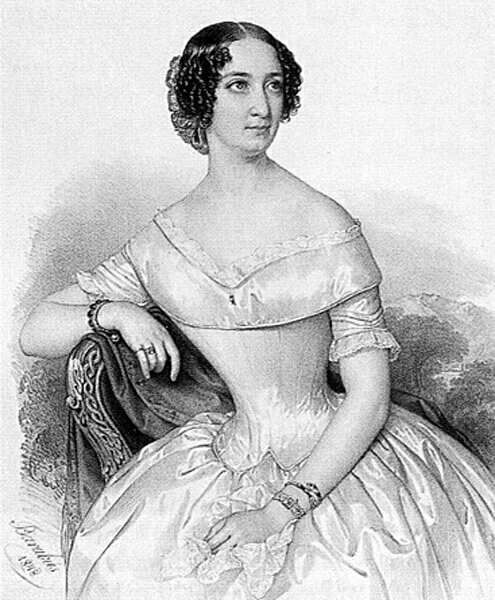
Given the revolutionary environment in 1848, the writer was also encouraged to change his name from Jókay to Jókai. Surnames ending with ‘y’ used to be a sign of noble origin; as such, refusing the aristocratic spelling symbolized the commitment to and enthusiasm for democratic reform.
Hungary’s glories in battle against the Imperial Austrian Army during the spring of 1849 impacted Jókai’s view of Hungary’s connection to the Habsburgs. The once moderate young man strongly supported the decision to abdicate the Austrian royal family. The defeat of the Freedom Fight, which he witnessed as he was present when the Hungarian troops surrendered at Világos in August 1849, shook Jókai to the core. In fact, he considered committing suicide, but convinced by his wife, Róza Laborfalvi he fled to Pest and was not captured by the Russian army.
Albeit Jókai was not formally imprisoned by the regime, the vengeful establishment viewed him with distrust. Jókai turned away from politics and dedicated his time to writing. His mission with his books served a societal purpose, however—to preserve and enrich the Hungarian language. As such he is credited with establishing the Hungarian literary language. Jókai’s rich works are not only novels, tales and essays, but also historical fiction, like the Midst the Wild Carpathians (also known as The Golden Age in Transylvania) or the Turkish World in Hungary. The romantic depiction and ‘mythologisation’ of Hungary’s history also contributed to strengthening a sense of national identity and belonging in his readership.
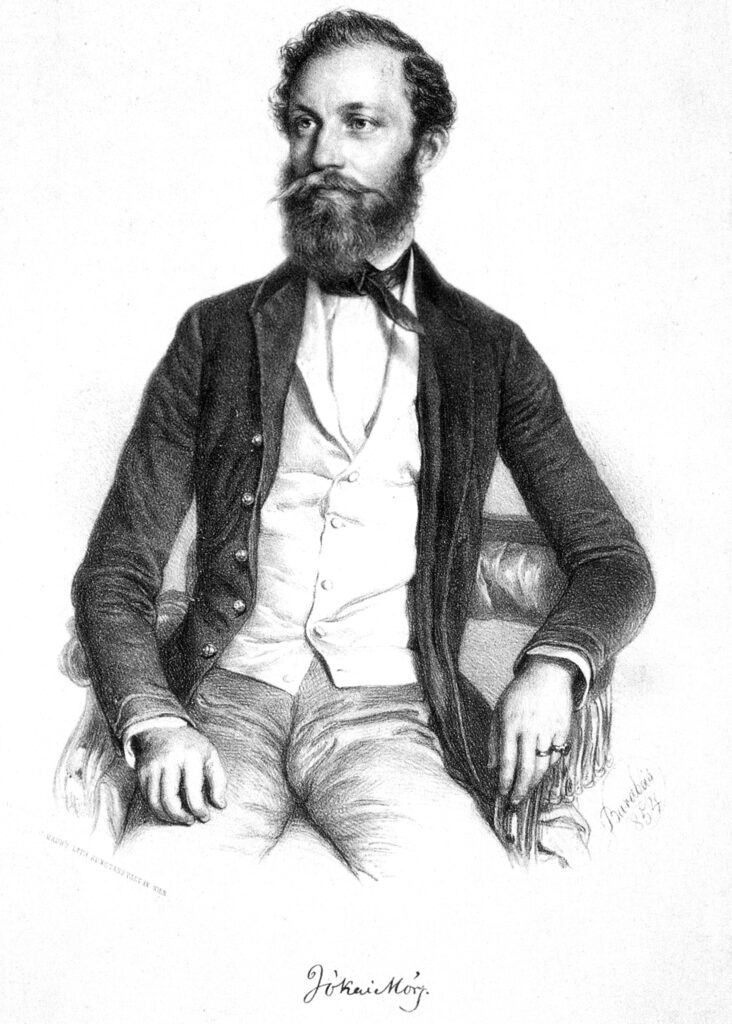
In 1867 Hungarian Austrian relations radically changed once again—now for the better. After the Austro–Hungarian Compromise of 1867, which normalized relations between the two sides that once rivalled during the Freedom Fight, Jókai was allowed to return to politics. He was involved in establishing a daily newspaper called A Hon (Home). In 1897 he was also appointed as member of the Upper House. In his elderly days—without losing the enthusiasm to write—he made a great contribution to the art form he once cherished as a young man: painting. It was Jókai who convinced Árpád Feszty to dedicate his large-scale project to the settling of the Hungarians, not to the biblical flood. Hence Feszty, who was also husband to Jókai’s adopted daughter, ended up painting one of the most grandiose paintings—nearly 120 metres long and 15 meters tall—in Hungarian history: The Feszty Cyclorama, which Hungarian Conservative has also covered.
It is difficult to overestimate Jókai’s literary work and impact. Not including his journalistic writing, his collected works fill 100 volumes. As an extremely prolific writer he excelled not only in historical fiction, but he also produced an early work of science fiction—Novel of the Next Century—predicting both a totalitarian turn in Russia as well as the rapid rise of aviation. While Jókai was deeply influenced by Romanticism, his work also shows great interest in personalities and personal experience—The Man with the Golden Touch as well as The Heartless Man’s Sons testify to this. The former is an investigation into happiness, and how one can pursue happiness in nature and civilization. The latter recounts the revolutionary events of the 1840s as well as the freedom fight, detailing the heroic journey of the Baradlay brothers, all of whom are ready to make great sacrifices—if not the ultimate sacrifice—for freedom.
Jókai has the reputation of being ‘the great storyteller of Hungary’, however, it is wrong to assume that his literary success is limited to Hungary. During his lifetime Jókai gained popularity in the English elite too. In fact, Queen Victoria herself is known to have been an admirer of the Hungarian writer.
Read more on Hungarian writers:



